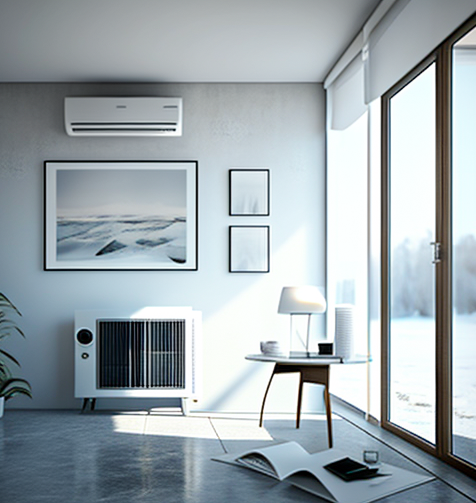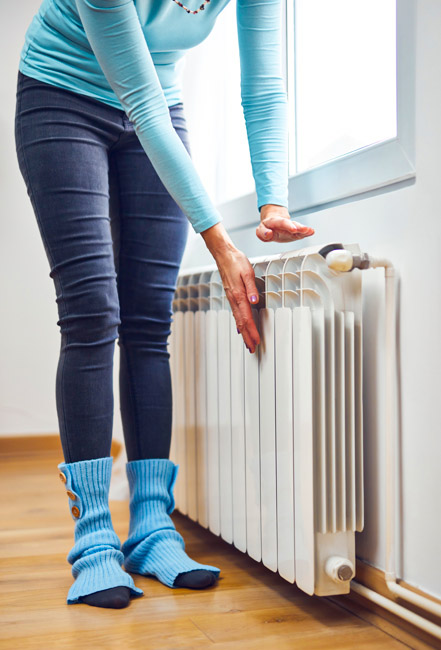What Type Of Heating Systems Do Most Arizona Homes Have?
Heating systems are a critical feature for any home, especially in areas with cold climates. Arizona is no exception; the state experiences a range of temperatures from freezing to hot and humid.
Therefore, understanding what type of HVAC systems are most commonly found in homes located in Arizona is essential for those seeking information about this topic. This article examines the different types of heating systems used by homeowners in Arizona, including their advantages and disadvantages.
Additionally, it explores why these systems may be preferred over other alternatives. By learning more about the various heating solutions available to Arizonans, readers will gain insight into how best to maintain comfortable living conditions throughout the year.

Overview Of Arizona Climate
Arizona is known for its hot and dry climate. Temperatures in the summer months range from between 90-120°F, with humidity levels around this time of year being low to moderate. Winters are milder, with temperatures usually ranging from 40-60°F during the coldest days of the season.
During this time, precipitation occurs more frequently than in other parts of the US due to Arizona’s location within a rain shadow region created by mountain ranges that block moisture coming off the Pacific Ocean. The state receives an average of 9 inches of rainfall each year, although some areas receive significantly less.
The majority of homes in Arizona rely on central air conditioning systems as well as heat pumps or furnaces to keep them cool during the hotter summer months and warm during cooler winter nights. These systems use electrical power or natural gas as their source energy, often depending on what type is most economical and available in a given area.
Factors To Consider When Choosing A Heating System
Arizona’s climate is known for its sunny days and mild winters, with temperatures rarely dropping low enough to require full-time heating. However, during the cooler months of winter, most Arizona homes do need some form of heating system in order to provide comfortable indoor temperatures.
The type of heating system that an Arizona homeowner chooses will depend on various factors such as budget constraints, size of the home, energy efficiency preferences, and desired comfort level.
Heating systems used by homeowners in Arizona include forced air furnaces fueled by natural gas or propane; electric resistance heaters; radiant flooring systems powered by hydronic or electricity; ductless mini-split systems; and portable space heaters.
Forced air furnaces are the most popular choice due to their ability to quickly warm a large area at a relatively low cost. Electric resistance heaters offer more precise control over room temperature but can be expensive to operate due to high energy costs associated with electricity use.
Hydronic radiant flooring provides even heat distribution throughout the house without any hot spots but requires professional installation which can be costly up front. Ductless mini-splits allow for zoned heating and cooling while also providing excellent energy efficiency ratings when compared against other types of systems.
Finally, portable space heaters may be a good option if only one room needs occasional supplemental heating during cold spells.
When shopping around for the right type of heating system it is important to consider all available options before making a decision so that you choose one that meets both your budgetary requirements and comfort expectations.
Research should also include consulting with qualified HVAC technicians who can advise on different models based upon individual needs and local building codes.
Forced Air Systems
Forced air systems are the most common heating system found in Arizona homes. These systems use an arrangement of ducts and vents to distribute heated air throughout a home, providing consistent warmth. Forced air systems typically have a central furnace that produces hot air which is then blown through the ducts by blowers or fans.
This type of system offers several advantages because it can be used with existing ductwork, provides efficient heat distribution, and requires less maintenance than other types of heating systems. Additionally, forced-air furnaces offer more control over temperature settings as they often come with thermostats for easy adjustment.
The main disadvantage to this type of system is that allergens such as pollen and dust can become airborne when the fan turns on and off constantly. As a result, regular filter changes may be necessary to keep these particles from entering into living areas via the ventilation system.

Radiant Heating Systems
The next type of heating system commonly found in Arizona homes is radiant heating. Radiant heat systems use infrared radiation to directly heat surfaces and objects within the home, rather than relying on air currents like forced air systems do. This type of system can be divided into two categories: hydronic or electric.
Hydronic radiant floor systems are made up of a closed loop of pipes installed beneath the flooring material. The pipes contain heated water or a glycol/water mixture that radiates heat upwards through the flooring surface.
Electric radiant floors consist of electrical cables or mats mounted below the floor which generate their own heat when electricity passes through them. Both types of radiant floor systems provide even levels of warmth throughout the home, however they take longer to warm up than other types of systems due to the slow transfer rate between objects and the surrounding air temperature.
Radiant ceiling panels are another form of radiant heating used in residential buildings located in Arizona’s dry climate. These panels emit infrared radiation from above, providing evenly distributed warmth across all areas in a room without any hot spots as with baseboard units.
In addition, since there isn’t an accumulation of dust particles being circulated around by fans as with forced-air systems, these panels help improve indoor air quality by reducing allergens present in the environment.
Geothermal Heat Pumps
Geothermal heat pumps are a popular option for Arizona homes. These systems work by using the constant temperature of the earth to maintain comfortable temperatures in the home. A geothermal system works by transferring energy from underground into a building, or vice versa.
The process is known as ground source heat transfer(GSHP). In order to make this happen, an underground loop of pipes filled with water and antifreeze circulates through the area near the house where there is an abundance of thermal energy stored in the ground beneath it. This pump extracts that energy and uses it to warm or cool air within your home’s ductwork system.
Geothermal heat pumps are highly efficient because they use less electricity than other types of heating/cooling systems due to their reliance on natural sources of energy. Additionally, these systems require minimal maintenance once installed since all components are hidden away below-ground level and face far fewer environmental stresses when compared to conventional models.
As such, geothermal systems may last up to 25 years with proper care and upkeep. Geothermal heat pumps offer numerous benefits for Arizona residents including lower monthly utility bills, improved indoor air quality, quieter operation, greater durability, and reduced environmental impact.
Furthermore, individuals who install this type of system can qualify for federal tax credits which further reduce operational costs over time. Given its many advantages, geothermal technology has become increasingly popular among Arizonans looking for reliable yet cost effective heating solutions during extreme weather conditions.
Solar Heating Systems
Solar heating systems are becoming increasingly popular in Arizona, as they are an efficient and cost-effective way to heat a home. Solar heating systems use the sun’s energy, which is free and abundant in Arizona, to power thermal collectors that absorb the sunlight and then convert it into usable heat for a building.
The most common type of solar heating system uses evacuated tubes or flat plate panels, which consist of two glass panels joined together with a vacuum between them. This allows sunlight to pass through and be absorbed by the tubes or panel surfaces, while minimizing losses due to convection and radiation.
Heat from these collectors is then transferred via pumps or fans into storage tanks located inside the house. From there, it can be used directly for space heating or hot water applications, or even sent back outside during periods of excess demand.
In addition to providing clean renewable energy year-round, solar heating systems can also reduce utility bills significantly over time.

Cost Comparison
The cost of heating systems for Arizona homes vary significantly. Generally, electric heat pumps are the least expensive option, followed by natural gas furnaces and boilers. Electric resistance baseboard heating is also an affordable choice but typically requires more energy to operate than other types of systems.
Solar thermal systems can be a viable choice in sunny areas like Arizona, as they use the sun’s rays to generate hot water or air with no additional fuel costs. These solar systems require an upfront investment that can range from moderate to significant depending on system size, however the long-term savings may outweigh this initial expenditure.
Additionally, many utility companies offer incentives for residents who switch their home heating sources to renewable energies such as solar power.







